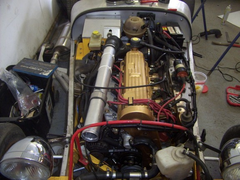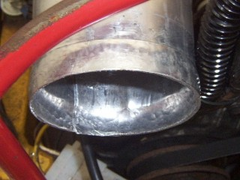
Injection Induction Tuning
Mark Allanson - 2/1/05 at 10:44 PM
I read somewhere that the length of the primary pipe between the air filter and the air metering device was critical to the power out put. Not
confusing this with the ram pipe length which controls the torque at any specific RPMs.
Does anyone have any info?
Stu16v - 2/1/05 at 11:13 PM
I personally can't see how this would make any discernable difference Mark. What does make a difference is how close the metering device is to
the engine. Too close, and the metering device can sense 'pulsing' that occurs naturally at certain rpm, which could fool the ECU into
thinking there isn't as much air flowing as there actually is. Too far away, and the metering device cannot respond as quickly, and the engine
gives a sluggish response.
HTH Stu.
gazza285 - 2/1/05 at 11:31 PM
You read bullshit. This is one modification that works with plastic fantastic Pugs, Citroen Saxos, fizogs etc.
I expect better of you Mark.
Mark Allanson - 2/1/05 at 11:44 PM
I cannot see why either, I kept the length from the air meter to the plenum chamber the same as Uncle Henry made it, but I did chop about 6" out
of the ram pipes.
I cannot remember where I read about the draw length being significant, but if you look at all the performance sites, you will see that the air filter
is on the end of a VERY long tube which attaches to the air meter.
I have done the same blindly, but I needed to do it anyway to get cold air to enter the system
stephen_gusterson - 2/1/05 at 11:57 PM
Mark
the same cars often have blue lights in the washer jets and coloured caps on the tyre valves.

Id look for more scientific proof
I was thinking of the 'get cold air in as its more dense' theory the other day.
Do we all notice a huge improvent in power in January compared to july, when the air intake is much colder?
I dont.
atb
steve
[Edited on 2/1/05 by stephen_gusterson]
Stu16v - 3/1/05 at 12:00 AM
quote:
I cannot remember where I read about the draw length being significant, but if you look at all the performance sites, you will see that the air filter
is on the end of a VERY long tube which attaches to the air meter.
Mainly because in a desperate effort to actually get more power from these so-called 'performance' induction kits, they are trying to get
the air filter as close as possible to a fresh supply of cold air (which is good...).
HTH Stu.
Mark Allanson - 3/1/05 at 12:04 AM
That is all I have tried to do, I will post a shot tomorrow night.
gazza, I have even fitted a Chav filter to keep up appearances!

P.S. I was going to leave this mod until after the SVA, but needed something to hang the loom from to make it all tidy 

Rob Lane - 3/1/05 at 09:45 AM
Steve,
Yes, you do notice the difference but only on a poorly tuned engine.
If the engine is in a poor state of tune and struggling to make power, then any small increase that improves that power shows up.
Generally we use engines that are running efficiently so we don't notice.
If you have a tuned engine built up but requiring a rolling road to setup the changed variables. You drive it a couple of times in either warm or cold
and damp and you will notice the difference.
As you can gather, speaking from experience 
Stu16v - 3/1/05 at 10:37 AM
As Rob says...
Also, bear in mind that most modern tintops will pull hot intake air from the exhaust (to give quicker warm up time, and [rarer nowadays] stop the
carb freezing up in cold weather), and as it warms up, will change automatically to pulling in cold air. Manufacturers wouldn' go to this
hassle/expense if it didn't make a difference...
stephen_gusterson - 3/1/05 at 11:43 AM
theres no substitute for experience 
very very few car nowadays have a carb - so i wonder if icing is as much of a problem in efi cars?
The only time ive noticed a major change in power due to atmospherics was driving a fiat panda (!!!) 9,000ft up mount tiede in tenerife. The car had
no power to start with, but buy the time it got that high, with the lower air density, it was next to bum all.
atb
steve
[Edited on 3/1/05 by stephen_gusterson]
Stu16v - 3/1/05 at 12:10 PM
I suppose the other thing is that it would be difficult to actually notice a change in power in an average car, between a hot day, and a cold one. At
a guess, a reasonably powered car might make 4-5BHP more on a cold day, and the only time you are likely to notice that is if you are prepared to
drive it flat out.
Not advisable when there is ice on the roads... 


Northy - 4/1/05 at 08:39 PM
Where's the pics Mark? 
stephen_gusterson - 4/1/05 at 09:20 PM
That follows on to my next point. Ive never bought a K and N filter, but I seriously doubt they make much difference - and if you only get a 5hp ish
gain.......
atb
steve
quote:
Originally posted by Stu16v
I suppose the other thing is that it would be difficult to actually notice a change in power in an average car, between a hot day, and a cold one. At
a guess, a reasonably powered car might make 4-5BHP more on a cold day, and the only time you are likely to notice that is if you are prepared to
drive it flat out.
Not advisable when there is ice on the roads... 


[Edited on 4/1/05 by stephen_gusterson]
Mark Allanson - 4/1/05 at 10:53 PM
quote:
Originally posted by Northy
Where's the pics Mark? 
Here


I need another rubber 90° bend from a Rover 600 to attach the chav filter to the home made 70mm induction tube (made from 1.2mm ally sheet - glutton
for punishment!)


Rescued attachment Induction Route.jpg
Mark Allanson - 4/1/05 at 10:59 PM
Its amazing what you can do with 5 billy clips and an ally/bronze duomig!


Rescued attachment Induction Route2.jpg









